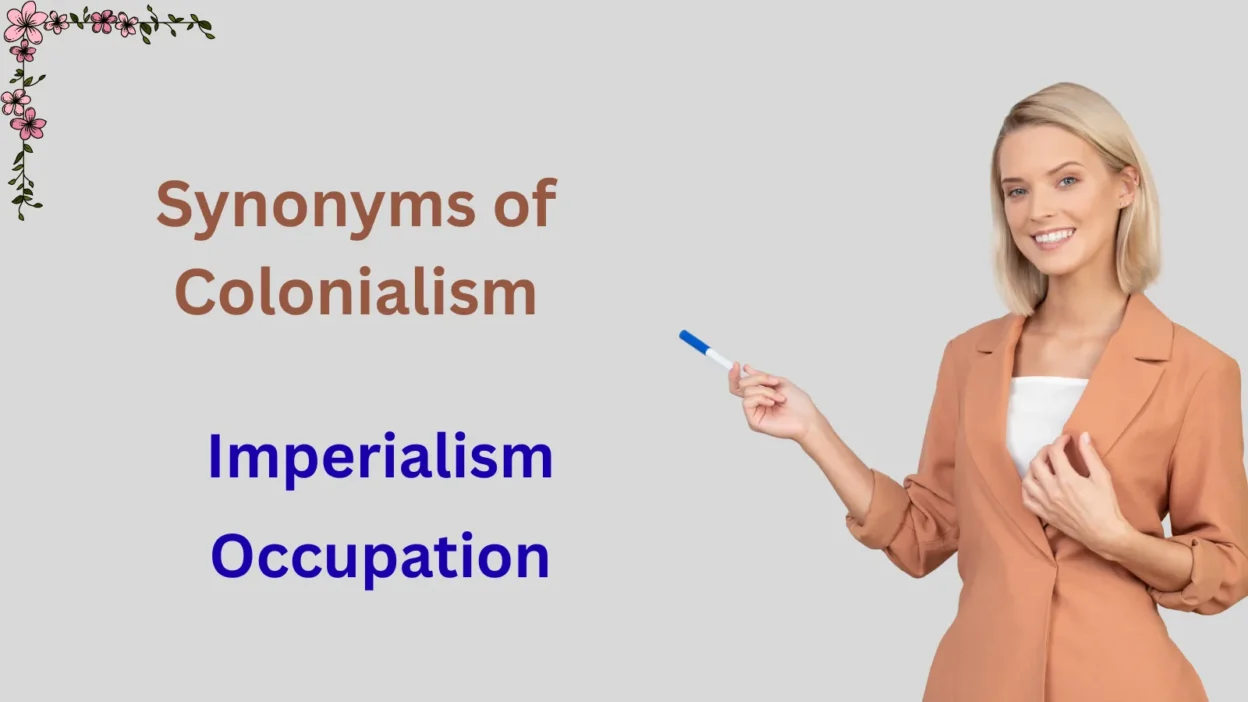Synonyms of Colonialism help describe systems of domination, foreign control, or exploitation, such as imperialism, expansionism, or colonization. For example, historians often debate how colonialism shaped modern nations and cultures. Using the right synonym of colonialism allows you to highlight different aspects of power, conquest, and cultural influence. Each word adds its own shade of meaning when discussing history, politics, or global relations.
If you’re writing about history, sociology, or international affairs, choosing precise synonyms for colonialism makes your descriptions more accurate, powerful, and thought-provoking.
In this article, you’ll get the meaning and example sentence for each synonym of colonialism so that you can write with clarity and depth. Ready to explore the many dimensions of colonialism? Let’s begin!
What Does Colonialism Mean?
At its core, colonialism refers to the practice of one nation establishing control over another territory and exploiting its resources. It often involves:
- Political domination
- Economic exploitation
- Cultural influence or suppression
- Settlement or migration by the colonizing power
It’s not just about expansion—it’s about unequal power dynamics, imposed systems, and lasting historical impact. Think of colonialism as a force that reshaped societies, economies, and identities across the world.
30 Synonyms of Colonialism with Usage Guidance
1. Imperialism
Meaning: Extending a nation’s power through force or diplomacy.
Example: “British imperialism reshaped global trade routes.”
Use When: Academic or political discussions of global expansion.
2. Conquest
Meaning: Taking control of land by force.
Example: “The conquest of new territories fueled the empire’s growth.”
Use When: Describing a military takeover.
3. Domination
Meaning: Exercising control over people or lands.
Example: “The domination of native cultures erased many traditions.”
Use When: Emphasizing power imbalance or oppression.
4. Occupation
Meaning: Taking possession of land by military or political means.
Example: “The long occupation drained local resources.”
Use When: Modern political or historical conflicts.
5. Annexation
Meaning: Adding territory to a state’s domain.
Example: “The annexation of land was met with resistance.”
Use When: Legal or political descriptions of land acquisition.
6. Expansionism
Meaning: A policy of territorial or economic growth.
Example: “Expansionism was central to the nation’s 19th-century agenda.”
Use When: Neutral or academic tone about policy.
7. Exploitation
Meaning: Taking unfair advantage of people or resources.
Example: “Colonial exploitation left nations economically dependent.”
Use When: Highlighting economic or moral harm.
8. Control
Meaning: Authority over territory or people.
Example: “Colonial control reshaped legal systems.”
Use When: General, straightforward reference to power.
9. Suppression
Meaning: Forcing people into silence or submission.
Example: “The suppression of local customs was widespread.”
Use When: Highlighting cultural and social impacts.
10. Oppression
Meaning: Cruel or unjust use of authority.
Example: “Colonial oppression stripped people of their rights.”
Use When: Emotional or human rights–focused writing.
11. Expropriation
Meaning: Taking land or property without consent.
Example: “The expropriation of native land caused mass displacement.”
Use When: Legal, historical, or economic contexts.
12. Settler Rule
Meaning: Governance established by foreign settlers.
Example: “Settler rule often marginalized indigenous populations.”
Use When: Discussing settler colonies like Australia or Canada.
13. Overrule
Meaning: Imposing decisions over another group.
Example: “Colonial powers would often overrule native leaders.”
Use When: Stressing the lack of local authority.
14. Patronage System
Meaning: A hierarchy where colonizers dictate opportunities.
Example: “The patronage system reinforced inequality.”
Use When: Explaining colonial bureaucracy.
15. Cultural Domination
Meaning: Imposing language, religion, and traditions.
Example: “Colonialism often meant cultural domination.”
Use When: Focusing on the erasure of traditions.
16. Empire-Building
Meaning: Expanding territorial reach to form empires.
Example: “Empire-building was fueled by economic ambition.”
Use When: Neutral or descriptive academic tone.
17. Invasion
Meaning: Entering a land with force.
Example: “The invasion was the first step toward colonization.”
Use When: Military takeover contexts.
18. Overlordship
Meaning: Rule by a powerful authority.
Example: “The overlordship of colonial rulers stifled autonomy.”
Use When: Historical or metaphorical writing.
19. Subjugation
Meaning: Bringing people under complete control.
Example: “Subjugation of natives defined colonial expansion.”
Use When: Strong, critical contexts.
20. Exploitation System
Meaning: A structure built on taking resources.
Example: “Colonialism created an exploitation system.”
Use When: Economic critique.
21. Neo-Colonialism
Meaning: Indirect control through economics or politics.
Example: “Some argue that aid policies are a form of neo-colonialism.”
Use When: Modern geopolitical discussions.
22. Trusteeship
Meaning: Claiming to “guide” or “protect” a people.
Example: “Trusteeship was often a mask for colonial rule.”
Use When: Euphemistic or deceptive colonial narratives.
23. Missionary Expansion
Meaning: Spreading religion as part of colonization.
Example: “Missionary expansion often went hand-in-hand with empire.”
Use When: Religious-cultural contexts.
24. Dependency
Meaning: Creating reliance on colonial powers.
Example: “Colonial dependency hindered local economies.”
Use When: Economic or political analysis.
25. Overreach
Meaning: Extending beyond natural limits.
Example: “The empire’s overreach led to its downfall.”
Use When: Critical or reflective writing.
26. Political Domination
Meaning: Governing without consent.
Example: “Political domination replaced local decision-making.”
Use When: Highlighting governance and authority.
27. Resource Extraction
Meaning: Taking natural wealth from colonies.
Example: “Resource extraction was the backbone of colonial economies.”
Use When: Economic focus.
28. Dispossession
Meaning: Forcibly removing people from land.
Example: “Indigenous groups suffered dispossession under colonial rule.”
Use When: Emphasizing injustice and loss.
29. Foreign Rule
Meaning: Governance by outsiders.
Example: “Foreign rule often destabilized traditional structures.”
Use When: Neutral, historical reference.
30. Hegemony
Meaning: Dominance of one group over another.
Example: “Colonial hegemony shaped cultural identities.”
Use When: Academic or sociopolitical writing.
Choosing the Right Synonym Based on Tone and Context
- Neutral & Academic: Imperialism, expansionism, foreign rule, empire-building.
- Critical & Emotional: Oppression, dispossession, subjugation, exploitation.
- Economic: Expropriation, resource extraction, dependency.
- Cultural: Missionary expansion, cultural domination, hegemony.
- Modern Discussions: Neo-colonialism, trusteeship, political domination.
Cultural Note: In postcolonial studies, words like imperialism and hegemony are often preferred in academic contexts, while terms like oppression or dispossession resonate more in activist or emotional narratives.
Conclusion
Colonialism is a complex word tied to history, power, and influence, and knowing its synonyms helps you capture different shades of meaning. Whether you use imperialism, expansionism, domination, or hegemony, each term brings its own nuance when discussing global relations, politics, or historical narratives.
By choosing the right synonym of colonialism, you not only enrich your writing but also express ideas with greater precision. From academic essays to thoughtful discussions, these alternatives let you approach the topic with depth, clarity, and authority.
Language shapes understanding, and the words you choose can highlight oppression, resilience, or transformation. Use these synonyms to write with impact and insight.





